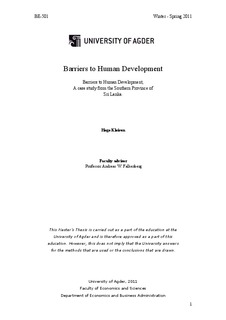| dc.description.abstract | This master thesis focuses on barriers of human development in the Southern
Province of Sri Lanka. According to the new view of, the effect of foreign aid should
be measured on the basis of more variables than economy. This thesis has been based
upon the dimensions of: the socio-economic situation, health, education, gender
issues, family and network, caste, and Government and NGO’s. Due to expert- and
empirical interviews, all of these dimensions were found to have a negative effect on
the human development in the Southern Province, accept from family and network.
Family and network were found to have a positive effect. According to Falkenberg’s
theory of the three basic elements of quality of life, the Southern Province was found
to have a poor foundation of quality of life. Coleman’s theory showed that it was only
the resource of family network that could help in creating equal opportunity in the
future and the Southern Province was situated on the second lowest level in Maslow’s
hierarchy of needs. The main recommendations that have been made from this
research is to provide employment and a stable income, create campaigns on change
of attitude, and to help maintain the strong family-ties. | no_NO |
